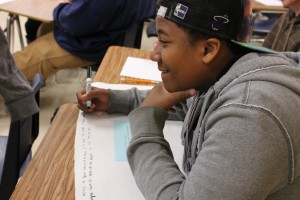Breaking the Silence: English project strikes chord with students

By Francicso Turrubiates |
Students in English III viewed a TED Talk video featuring Clint Smith discussing the dangers of silence. Students received a poster with three guiding questions to answer in their own opinion what Smith was trying to achieve with his speech.
“The reason I think it’s important is, as I mention to them, we teachers don’t live in the hall ways, restrooms, courtyard, or football field. So it is important for them to know the power of their voice and how it can be a catalyst for change, and also need to be aware of their repercussions of their silence,” said English III teacher Elaine Perez.
Students learned through the video that silence is an issue in the United States, in streets, schools, and workplaces. Standing up for what is right, helping those that aren’t being heard can make a difference in society.
Silence happens every day, and one of the biggest problems is in social media. Students have their Facebook, Twitter, Instagram, Snapchat account and other apps easy to download and create public content. Social media starts drama with just a few words typed in less than a few seconds.
“I don’t really use social media, I ignore any kind of negative ideas or opinions; that’s what I just do,” freshman Sean Rollins said. “I feel that if they’re not doing anything to prevent children and adults from doing negative things, we need to speak up and do something about it.”
Unresolved rumors and bullying on social media and in person can lead to fights. Some students find it easier confronting the person than try to reach out to an adult to help solve the problem. But counselors say its best for students to talk to an open-minded adult about problems like silence and bullying, even if that seems like a hard thing to do.
“Each case has variables, [but] bullying is repeated or targeted behavior towards another person,” counselor Nancy Frase said. “A student wouldn’t probably tell or let an adult know [about bullying] due to the lack of information or a fear of revenge. In some case some parents may not like the boy or girl in their child’s relationship or because the fact that their child is gay or lesbian.”
Bullying victims are often students who seem not to fit in because of their appearance or those students who are struggling with sexual identity. But again, it is not always reported so not all victims fall in these categories. Reasons for secrecy tend to fall into one of seven categories, according to a 2005 review of research by University of Toronto social workers: The Cloak of Secrecy, Power, Self-Blame, Retaliation, Vulnerability, Fear of Losing a Friendship and Fear Adults Will Do Nothing.
On campus, there are several ways for students who are bullied to let their voices be heard. Mr. Cook, the STAN counselor, has a program to empower the bullied to take charge of their own situation, and the school hosts a Gay Straight Alliance which allows students a place to explore their thoughts and identities.
“Students need a space to explore their thoughts without the fear of judgment, so I believe it is essential for the development of everyone’s identity formation that s/he feels comfortable,” Gay Straight Alliance sponsor Paul Riser said.
According to Livescience, 62.4 percent of bullied gay and lesbian teens surveyed did not report the harassment to schools officials.
“I think some students will use their voice to stand against bullies, and others will not. Personalities and training coupled with life experience have a lot to do with whether a person will stand against bullying,” Riser said.
Using the curriculum and the guiding question of social change, English III teachers found this opportunity for students to learn the experience of keeping silence and letting their voices being heard. Social change only happens when others are no longer silent.
“I like the idea of it because it shows we matter, shows we have to speak up,” junior Cynthia Loredo said. “I feel that this is really important for us to know.”

